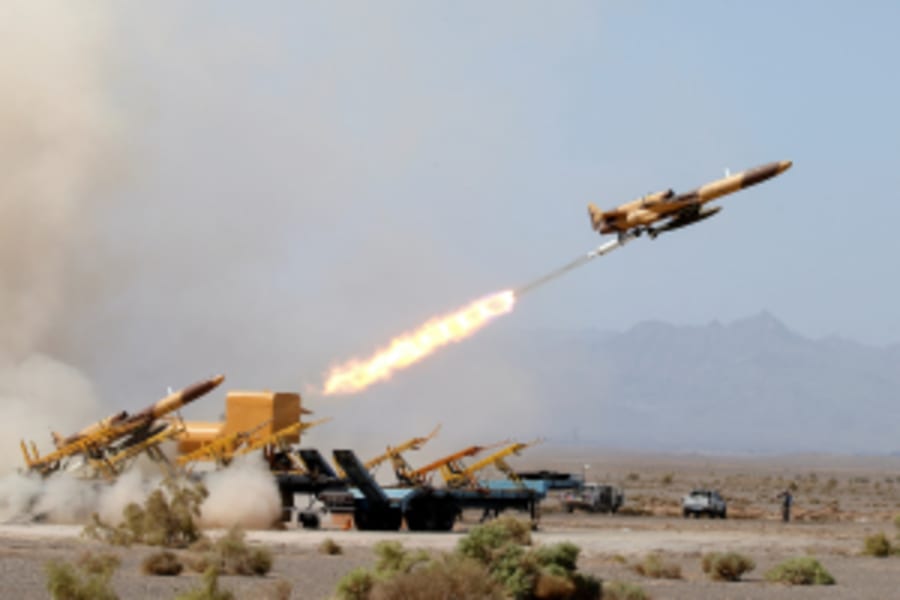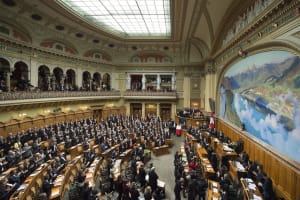New Palestinian Authority anti-Israel resolution targets Jewish communities in Judea and Samaria

While Israel is fighting against the Iranian-backed terrorist organizations Hamas and Hezbollah, the Palestinian Authority is reportedly preparing a new resolution at the United Nations to urge the international community to halt trade in Judea and Samaria, commonly known as the West Bank, and implement an arms embargo against Israel.
The proposed anti-Israel resolution that calls on nations to "distinguish their dealings with Israel from their actions in the occupied territories" is aimed at enforcing the ruling by the International Court of Justice (ICJ) which states that building Jewish settlements in Judea and Samaria is illegal.
While the resolution is expected to be adopted by the majority of UN member states, it will initially have a limited impact on Israel since UN General Assembly resolutions are not legally binding. The “State of Palestine” has been a non-member observer state in the UN body since 2012.
The Palestinian Authority (PA) in Ramallah, led by Fatah party leader Mahmoud Abbas, reportedly plans to introduce the resolution in September during the first week of the 70th UN General Assembly (UNGA).
The PA specifically seeks to implement the July ICEJ ruling, which deems Jewish communities in Judea, Samaria and East Jerusalem as illegal under international law.
“Israeli settlements in the West Bank and East Jerusalem, and the regime associated with them, have been established and are being maintained in violation of international law,” ICJ’s Lebanese-born President Nawaf Salam claimed last month.
At that time, Israeli Prime Minister Benjamin Netanyahu dismissed the ICJ ruling as "absurd."
“The Jewish people are not occupiers in their own land, including in our eternal capital Jerusalem nor in Judea and Samaria, our historical homeland,” Netanyahu stated. “No absurd opinion in The Hague can deny this historical truth or the legal right of Israelis to live in their own communities in our ancestral home.”
The PA's proposed resolution will also call for an end of trade with Israel in Judea and Samaria. This move also includes an embargo on weapons exports to Israel Defense Forces, which is conducting counter-terror operations in East Jerusalem, Judea and Samaria.
Ramallah will also seek broad international statehood recognition and demand that the UN ensures the State of Israel "acts in accordance with international law, including humanitarian law."
Furthermore, Ramallah will also urge Switzerland to assemble the High Contracting Parties to the Geneva Conventions to "determine collective actions to ensure its implementation."
Finally, the PA resolution is expected to present a "timeline for ending the occupation" and a path toward a two-state solution.
The two-state solution has been presented in various forms since the late 1930s, including the British Peel Commission in 1937, the UN Partition Plan in 1947, the U.S.-led Camp David Summit in 2000 and the Annapolis Conference in 2007.
In a separate negotiation with Abbas, "Olmert's Proposal" in 2008, then-Israeli Prime Minister Ehud Olmert made an offer involving territorial concessions, including land swaps and a shared Jerusalem. Abbas did not accept the offer, citing concerns over the terms and the lack of a final status agreement.
In 2020, U.S. President Donald Trump and Netanyahu presented the "Trump Peace Plan," which included provisions for a demilitarized Palestinian state with significant Israeli security measures and territorial adjustments. The plan was criticized by the PA and other Palestinian groups as biased in favor of Israel.
These proposals reflect Israel's willingness to negotiate a two-state solution in the past, influenced by the political and security context during those times.
While the PA has engaged in negotiations at various times and agrees to the concept of a two-state solution, the specific terms and conditions proposed in those plans – including borders, security and the status of Jerusalem – have often been met with varying degrees of acceptance or rejection by the PA, which has led to stalled negotiations with Israel.
In December 2023, two months after Hamas terrorists invaded and murdered 1,200 men, women and children in southern Israel, Netanyahu strongly opposed the two-state solution, emphasizing it is not viable as long as the Jewish state faces existential threats.
“I’m proud that I prevented the establishment of a Palestinian state because today everybody understands what that Palestine state could have been, now that we’ve seen the little Palestinian state in Gaza."
The PA is often described as more moderate than Hamas, particularly in its approach to negotiations with Israel. However, there have been documented instances where PA schools and media have promoted anti-Israel sentiments and hostile rhetoric towards Jews. This complex situation reflects ongoing tensions and conflicting narratives in the region.
We recommend to read:

The All Israel News Staff is a team of journalists in Israel.














